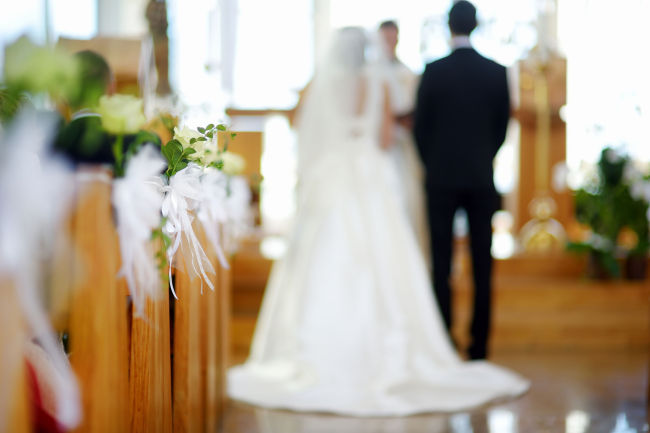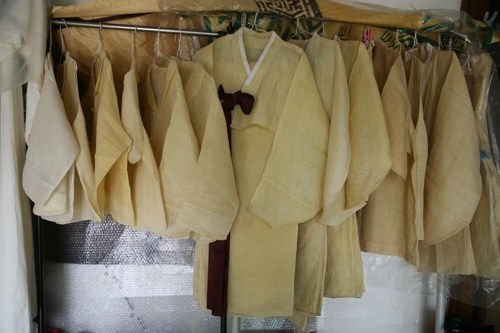[Feature] Traditional leap month beliefs fading among young generation
By Jo He-rimPublished : July 9, 2017 - 16:31
“No harm can be done even if you hang a corpse upside down in a leap month.”
This is a Korean saying that describes a local superstition surrounding the extra 13th month of the lunar calendar.
This is a Korean saying that describes a local superstition surrounding the extra 13th month of the lunar calendar.

According to traditional beliefs, during a leap month, good family events, mainly marriages, are to be avoided, while it is OK to carry out funeral-related works such as changing burial sites.
South Korea is in the middle of a 13th month lasting from June 24 to July 22, but the myths and superstitions surrounding it appear to be fading -- at least among the young generation.
“I did not really know it was a leap month until I went to the wedding hall company to settle my wedding day last year,” said 28-year-old Cho In-young who got married in the last week of June. “We decided to go ahead, because none of us and our parents cared.”
Another bride, Yoon Ji-young, specifically chose to tie the knot during the leap month, because of a 50 percent discount that a wedding consultancy offered.
“As Christians, our family does not believe in such superstitions,” she said.
Wedding industry insiders said leap-month discounts and special promotions are also disappearing, because there are more couples who think like Yoon these days.
“Young couples nowadays do not seem to be aware of the leap month traditions. We saw only a 5 percent decrease in reservations compared to last year, and the rate could have been influenced by the rainy season,” said an official at a wedding hall company in Apgujeong, central Seoul.
To the generation used to the solar calendar, the concept of a leap month can be unfamiliar.
Kim Seung-woo, a 29-year-old university student revealed that he had heard of the term, but did not know what it was exactly.
Leap months occur seven times over a 19-year period in the lunar calendar because a month is counted by a cycle of the moon. A lunar year is usually 11 days shorter than its solar counterpart. To compensate the difference, an extra month is inserted around every three years.
There are superstitions that no ghost or spirit exists to influence human affairs during leap months, as they do not recognize the month. This also means that there are no good spirits to watch over newlyweds and families, and no bad spirits to interrupt the way to the afterlife.
Such superstitions date back only a few centuries, scholars said, adding that until the late Joseon era, the month was considered a good time to do anything.
Kim Myung-ja, an emeritus professor of the Department of Folklore at Andong National University, explained that tradition changed.
“As time passed, people became more cautious in leap months and they started to avoid getting married or giving birth,” she said.

Many now seem less concerned about whether there are good spirts to watch over them during leap months. However, when it comes to evil spirits, more people seem to care.
Burial and cremation-related affairs, in particular the relocation of corpses already buried, have gone up sharply since the leap month began.
Online reservations for the 58 public cremation facilities across the nation have been fully booked with over 20,000 cremations of buried corpses.
Aware of the rise in demand, the ministry announced that it would extend the reservation period for cremation services from the current 15 days in advance to 30 days. It also said extra cremation furnaces would be put to use if there is a shortage during the month.
“My father’s body will be removed from its current burial place in Cheonan to a woodland burial after cremation next week, so that he can peacefully rest amid nature,” said Kim, who declined to reveal her full name.
“It is simple. People want to get unpleasant or worrying tasks done during the month because they say it is less harmful.”
By Jo He-rim (herim@heraldcorp.com)



![[AtoZ into Korean mind] Humor in Korea: Navigating the line between what's funny and not](http://res.heraldm.com/phpwas/restmb_idxmake.php?idx=644&simg=/content/image/2024/04/22/20240422050642_0.jpg&u=)
![[Exclusive] Korean military set to ban iPhones over 'security' concerns](http://res.heraldm.com/phpwas/restmb_idxmake.php?idx=644&simg=/content/image/2024/04/23/20240423050599_0.jpg&u=20240423183955)



![[Graphic News] 77% of young Koreans still financially dependent](http://res.heraldm.com/phpwas/restmb_idxmake.php?idx=644&simg=/content/image/2024/04/22/20240422050762_0.gif&u=)
![[Herald Interview] Why Toss invited hackers to penetrate its system](http://res.heraldm.com/phpwas/restmb_idxmake.php?idx=644&simg=/content/image/2024/04/22/20240422050569_0.jpg&u=20240422150649)






![[Exclusive] Korean military to ban iPhones over security issues](http://res.heraldm.com/phpwas/restmb_idxmake.php?idx=652&simg=/content/image/2024/04/23/20240423050599_0.jpg&u=20240423183955)



![[Today’s K-pop] Ateez confirms US tour details](http://res.heraldm.com/phpwas/restmb_idxmake.php?idx=642&simg=/content/image/2024/04/23/20240423050700_0.jpg&u=)